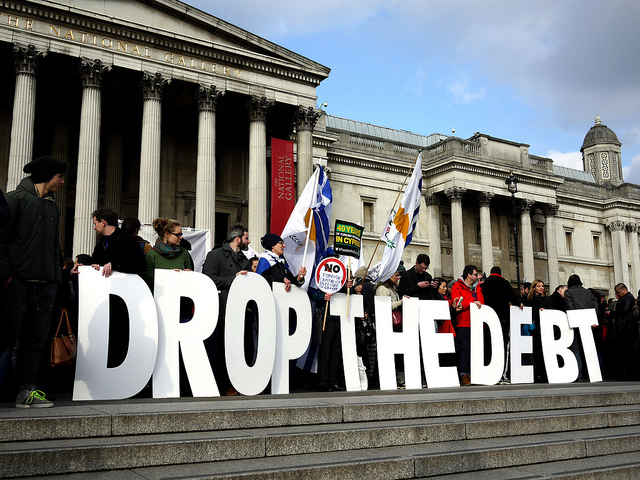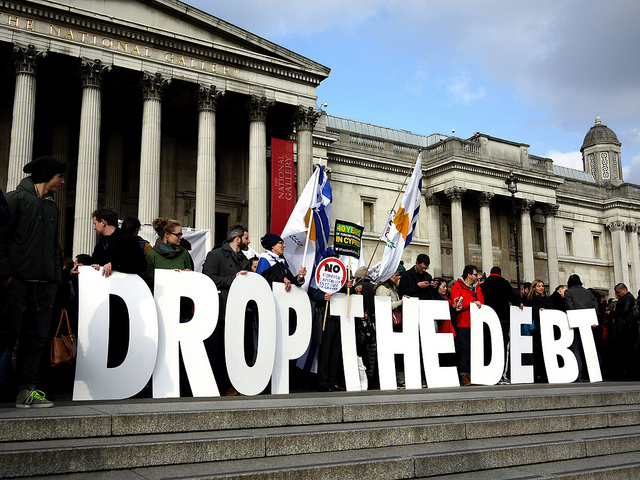
Support justice-driven, accurate and transparent news — make a quick donation to Truthout today!
 15 FEBRUARY 2015, LONDON- People gathered in Trafalgar Square to show support for the new Greek Government run by the anti-austerity party Syriza. “If Syriza succeeds in rolling back the EU-mandated measures,” writes Senator Sanders, “It could encourage dissident political movements in other parts of Europe; the right-wing governments in Europe’s periphery are terrified of a Greek success at the negotiating table.” (Photo: Sheila)
15 FEBRUARY 2015, LONDON- People gathered in Trafalgar Square to show support for the new Greek Government run by the anti-austerity party Syriza. “If Syriza succeeds in rolling back the EU-mandated measures,” writes Senator Sanders, “It could encourage dissident political movements in other parts of Europe; the right-wing governments in Europe’s periphery are terrified of a Greek success at the negotiating table.” (Photo: Sheila)
While the wealthiest 85 individuals on the planet own more wealth than the bottom half of the world’s population – and when the top 1% will soon own more wealth than the bottom 99% – the people of Greece and the anti-austerity party, Syriza, they elected to lead them are struggling to rebuild their economy so that ordinary people there can live with a shred of dignity and security.
But powerful international interests are putting the pro-growth, pro-worker experiment in progressive democracy currently underway in grave danger.
Greece is on the verge of leaving the Eurozone rather than accept a continuation of the reduced government spending measures imposed on it by the union’s other 18 members in exchange for a credit package that expires at the end of February; talks in Brussels broke down on Monday after the Syriza negotiators refused to break the party’s promises to the Greek people by accepting more punishing austerity. The German government, the European Commission and the European Central Bank (ECB) all seem intent on bringing the new government to heel, regardless of the people for whom German finance minister Wolfgang Schäuble claims to feel sorry.
The real concern, apparently, is that democracy may go too far for austerity advocates to continue imposing their economic ideology from a distance: in Spain, Portugal, Finland and elsewhere, the patience of citizens is wearing thin as a growing number of them awaken to the stark reality that, while the very rich get much richer, the austerity programs their governments dutifully implemented are the cause rather than the cure for what ails their economies.
If Syriza succeeds in rolling back the EU-mandated measures, it could encourage dissident political movements in other parts of Europe; the right-wing governments in Europe’s periphery are terrified of a Greek success at the negotiating table.
Syriza’s recent electoral success was a clear indictment of the budget-strangling policies that left Greece mired in a depression for the last five years. Back at the beginning, money that should have been used to protect Greek families and rebuild Greek communities was instead used to protect the holders of Greek government debt – mainly French and German banks.
But it wasn’t enough. In 2010, Greece reached the point that it could no longer service its foreign debt, and it turned to its European partners for help; that help arrived in the form of more debt and a mandate to cut wages, pensions, public investment and social security benefits, while raising the VAT and upping taxes on tobacco, alcoholic and luxury items. The result: Greece’s finances got worse as real GDP collapsed and unemployment rose to more than 25%.
With incomes falling and unemployment rising, the deficits the government faced only grew bigger. By 2012, Greece needed another infusion of cash to stay afloat and, once again, a loan was made on the condition that the government remain steadfast in its commitment to reducing government spending. The Greek economy continued to slow, youth unemployment climbed to an unbelievable 50%, wages declined and many Greeks lost their access to electricity, health care and other basic necessities of life.
Greek voters finally rejected the old political order and looked for a new party to restore dignity and economic viability to their tiny nation-state – and empowered a progressive coalition government led by Syriza that is pro-Europe, pro-America and determined to save their country.
The new prime minister, Alexis Tsipras, announced an immediate change in the austerity policies demanded by the EU and reversed some of the most arbitrary and unproductive actions of the previous five years – including the privatization of state-owned utilities and public real estate around the Acropolis and efforts to crush collective bargaining. He promised to raise the minimum wage, rehire fired workers and to fight a Greek oligarchy well-known for its corruption and tax evasion.
But if Syriza is unable to succeed in rolling back some of the spending cuts imposed by the EU, it will not only make a sham of the recent democratic election held there … but it could also bring increased support for the Greek neo-Nazi party, Golden Dawn, which took third place in that election.
My hope instead is that both Syriza and the EU coalition will work toward a compromise that promotes economic growth for all Europeans. A more heavy-handed approach aimed at “teaching the Greeks a lesson” would not only be an economic mistake but, perhaps more importantly, a political mistake. Anything that weakens the Greek economy and undermines democracy could strengthen the Greek neo-Nazi movement and do real harm to economically vulnerable people in Greece.
The new Greek government needs support in establishing pro-growth policies which create jobs, expand their economy and enable them to pay down their debts. Demanding that creditors are paid before any of that is allowed to happen may come at a very heavy price for more than just the people of Greece.
This article was amended 17 February 2015 to clarify the number of countries in the Eurozone. There are 19.
Speaking against the authoritarian crackdown
In the midst of a nationwide attack on civil liberties, Truthout urgently needs your help.
Journalism is a critical tool in the fight against Trump and his extremist agenda. The right wing knows this — that’s why they’ve taken over many legacy media publications.
But we won’t let truth be replaced by propaganda. As the Trump administration works to silence dissent, please support nonprofit independent journalism. Truthout is almost entirely funded by individual giving, so a one-time or monthly donation goes a long way. Click below to sustain our work.